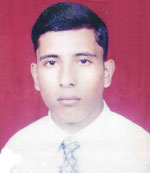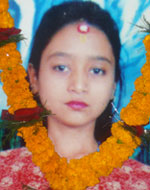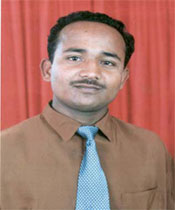Related Links
Case Updates
Krishna Adhikari
 On 6 June 2004, Krishna Prasad Adhikari, a resident of Fujel village of Gorkha District, was murdered in Chitwan District by Maoist cadres. Krishna Prasad was visiting his grandparents after having taken the SLC examinations, and he was abducted from Bakullahar Chowk by men who came on a motorcycle ...
On 6 June 2004, Krishna Prasad Adhikari, a resident of Fujel village of Gorkha District, was murdered in Chitwan District by Maoist cadres. Krishna Prasad was visiting his grandparents after having taken the SLC examinations, and he was abducted from Bakullahar Chowk by men who came on a motorcycle ... Maina Sunuwar
 Around 6 am on February 17, 2004, a group of RNA soldiers arrested Ms
Maina Sunuwar, a 15-year-old schoolgirl of Kharelthok VDC-6, Kavre
district. She disappeared since her arrest. Her family members, with
support from villagers and school where Maina was a student, visited
detention centers ...
Around 6 am on February 17, 2004, a group of RNA soldiers arrested Ms
Maina Sunuwar, a 15-year-old schoolgirl of Kharelthok VDC-6, Kavre
district. She disappeared since her arrest. Her family members, with
support from villagers and school where Maina was a student, visited
detention centers ... Sanjeev Kumar Karna
 Sanjeev Kumar Karna was one among the 11 persons arrested on October 8, 2003. On that fateful day, they had gone to attend a picnic program organized by the students at a place called Kariyachauri VDC-4, and from picnic, they went to Kataiya Chowri Area of Dhanusha district where they ate some food ...
Sanjeev Kumar Karna was one among the 11 persons arrested on October 8, 2003. On that fateful day, they had gone to attend a picnic program organized by the students at a place called Kariyachauri VDC-4, and from picnic, they went to Kataiya Chowri Area of Dhanusha district where they ate some food ... Arjun Bahadur Lama
Hari Prasad Bolakhe
Sarala Sapkota
Birendra Shah
Bishwanath Parajuli, Tom Nath Poudel and Dhan Bahadur Tamang
Chot Nath Ghimire and Shekhar Nath Ghimire
Bhauna Tharu
Pokhara Hosts Provincial Forum on Transitional Justice, Empowering Conflict Victims
Timed to coincide with the International Day for the Right to the Truth Concerning Gross Human Rights Violations and for the Dignity of Victims, the event aimed to fortify the network of conflict victims in the Gandaki Province.
The event addressed several crucial objectives, including enhancing support systems for wives of the victims of enforced disappearances within the conflict victims' network and acquainting participants with ongoing legal developments in transitional justice. Moreover, attendees were apprised of the strides made through strategic litigation efforts initiated by ICJ and AF for the benefit of wives of the victims of enforced disappearances.
The programme also facilitated meaningful interactions between conflict victims from various districts of the Gandaki province and officials from the Pokhara Metropolitan City. Participants gained insights into budget allocation and planning processes at the local level, enabling them to advocate for the inclusion of conflict victims' needs in municipal planning, particularly regarding interim reparation measures.
Conflict victims shared their experiences regarding reparation efforts undertaken by local governments. It was noted that districts with robust networks of conflict victims received greater attention from local authorities, with opportunities and needs of conflict victims being incorporated into annual plans. Conversely, in districts where victim networks were weaker, such efforts yielded limited results.
The forum underscored the critical importance of strengthening the network of conflict victims in every district, fostering synergies among them, and enhancing access to opportunities and recognition from local governments. As the event drew to a close, participants left with a renewed sense of empowerment and solidarity, poised to advocate for their rights and needs with greater efficacy.
























Join Us